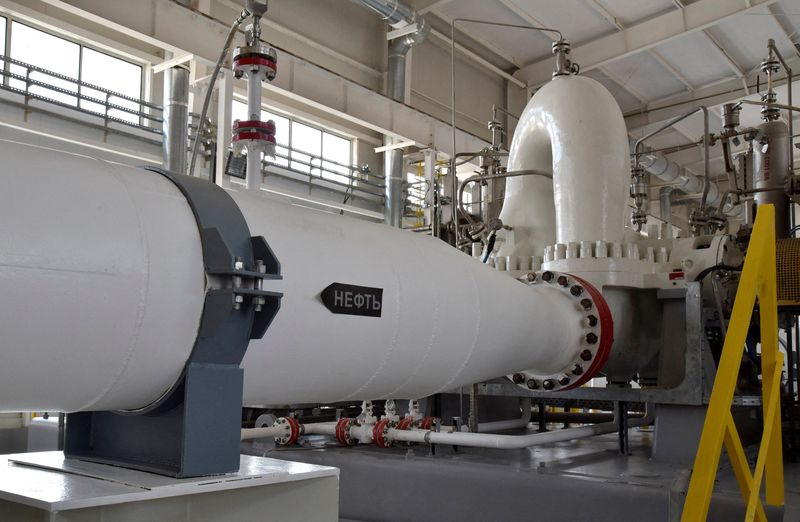By Sabrina Valle and Ron Bousso
LONDON (Reuters) -Western energy majors will cut output and lose billions of dollars if Russia, as is feared, suspends a pipeline that is almost the only export route for oil from land-locked Kazakhstan, company sources, traders and analysts say.
The closure of the CPC pipeline that carries oil from Kazakhstan to the Black Sea Russian export terminal in the port of Novorossiisk would shut in more than 1% of global oil supply, exacerbating what is already the most severe energy crunch since the Arab oil embargo in the 1970s.
The pipeline, which runs through Russian territory and is owned by a consortium of Western, Asian, Russian and Kazakh companies, has been in the spotlight since Russia on Feb. 24 invaded Ukraine in what Moscow calls a "special military operation".
Last Wednesday, a court in Novorossiisk ordered CPC to suspend operations for 30 days, citing concern about oil spill management.
A Russian court on Monday overturned the ruling against CPC and instead fined it 200,000 roubles ($3,300).
The sources, however, said they still thought major disruption likely. Pipeline co-owner Russia has said all stoppages are driven by technical issues.
Storm damage in March has already interrupted flows through the 1.3 million barrels per day (bpd) oil artery, operated by the Caspian Pipeline Consortium.
Major oil companies, including Chevron (NYSE:CVX), Exxon Mobil (NYSE:XOM), Shell (LON:RDSa) and Italy's Eni, in addition to several Russian and Kazakh firms have stakes in the CPC. Western companies also hold stakes in Kazakh oilfields.
The CPC pipeline is the route for nearly all Kazakh oil exports.
Three sources at Western oil companies operating in Kazakhstan, asking not to be named because of the sensitivity of the issue, said they expected a prolonged CPC pipeline suspension.
One trader at a Western major said such an outage would result in a decline of 50 million tonnes of oil per year (1 million bpd) because land-locked Kazakhstan has limited alternative export routes.
Many Western companies have exited operations in Russia, with oil majors among the first to leave in the days after the conflict began. Western sanctions have disrupted Russian exports and pushed up energy prices.
In response, Russia made steps towards seizing oil and gas projects Sakhalin 1 and 2, where Shell and Exxon have stakes.
A Western executive familiar with CPC operations said Sakhalin was "a definite sign of things to come for CPC".
Shortly after Russia's invasion of Ukraine, international oil prices spiked to their highest levels since the records of 2008.
They have since eased to just above $100 a barrel as the market anticipates economic weakness will lower demand, although selling has been limited by concerns of tight supplies that would be exacerbated by a cut in CPC output.
"Losing one million barrels per day in an already tight environment can lead to an unsolvable problem for the oil market," Amrita Sen from Energy Aspects in London said.
JP Morgan analysts predicted last week oil prices could jump to an all-time high of $190 per barrel if a combined 3 million bpd of output from Russia and Kazakhstan was hit by sanctions and related issues.
LACK OF ALTERNATIVES
Kazakhstan produces some 1.6 million bpd of oil, and exports about 80% of that volume, mostly through the CPC.
Of the remainder, 15% leaves the country also via Russia, and around 5% goes to China and various destinations via rail and the Caspian Sea, Kazakhstan's Energy Ministry data shows.
Last week, Kazakh President Kassym-Jomart Tokayev told his government to diversify oil supply routes.
But that would take time, Camille Chautard, analyst at Moody’s ratings, said.
Oil majors have studied the viability of alternative routes in recent months, the three sources said, including to China and trans-Caspian shipments to Azerbaijan and Georgia. All of those options are challenging.
The pipeline to China can take oil from east and central Kazakhstan, but most of the large fields are in the West.
On the Caspian Sea, exporters face tanker shortages and have little capacity to take more oil.
"To be honest, I don't think we can re-route anything," one Western trader familiar with CPC operations said.
CHEVRON MOST EXPOSED
Chevron would be particularly exposed to any pipeline closure because it has the biggest Western stake in Kazakh production at around 380,000 bpd, or more than 12%, of its total output.
Recent temporary disruptions should not have a material impact on the company’s credit standing, but an eventual "prolonged disruption would be very material to Chevron's production volumes," Elena Nadtotchi from Moody’s said.
If Chevron’s investments in Kazakhstan were impaired or lost, that could lead to a ratings downgrade, she said.
A long-term closure would also threaten Chevron’s future growth plans. The U.S. major planned to boost output by 40% at Kazakhstan's largest field Tengiz to around 1 million bpd.
Credit Suisse analysts estimate that Chevron, which controls 50% of Tengiz, would have seen free cash flow rising to $3.0-$3.5 billion by 2024 following the expansion and to $4.0-$4.5 billion by 2026 on the basis of oil prices of $60 per barrel.
In May, Chevron flagged the risk of sanctions to its output but said measures had not yet had a material impact.
The Chevron-led Tengiz consortium TCO, which also includes Exxon, declined to comment on specific details if the CPC pipeline was shut.
"As global oil markets continue to encounter challenges arising from geopolitics, TCO’s primary focus is on maintaining safe operations, and we are exploring potential crude oil exporting options," it said in a statement to Reuters.
Exxon is the second largest foreign producer in Kazakhstan with output of 213,000 bpd of oil and 234 million cubic feet of gas. It is followed by Eni with some 145,000 barrels of oil equivalent per day, Shell with around 100,000 boed and TotalEnergies with some 80,000 boed in 2021.
Shell, Eni and Total declined to comment, as did Exxon, saying TCO was best-placed to respond.
